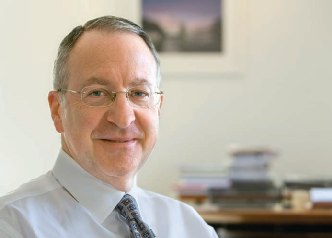Goals and aspirations
Midway in the fourth year of my presidency, I appreciate more than ever the critical importance of tapping the collective wisdom of the entire Cornell family to address current challenges and envision our shared future. Particularly in the midst of the stresses of the recession and its effects on Cornell, the input of students, faculty, staff, and alumni, as well as that of the University's past presidents—Dale Corson, Frank Rhodes, Hunter Rawlings, and Jeff Lehman '77—has proven invaluable. It is a major reason that we are weathering the storm with skill, optimism, and hope.
As many of you are undoubtedly aware, we are engaged in serious, university-wide strategic planning, which we are describing as "Reimagining Cornell." The effort has two goals: to identify our aspirations for the future and to plan for a leaner and stronger institution.
 Kent Fuchs, just completing his first year as provost, has taken the lead in developing a wide range of mechanisms for eliciting input from all sectors of the Ithaca campus, beginning with the insights and experience of the senior leadership team—the vice presidents and deans. The formal mechanisms have included task forces in each college; cross-cutting, multi-college task forces for broad areas like the life sciences and the social sciences; and a faculty planning committee, ably headed by Professor Ed Lawler, former dean of the School of Industrial and Labor Relations, which includes representation from Weill Cornell Medical College as well as the Ithaca campus. These groups are working to position Cornell for future academic excellence through structural change and enhanced focus.
Kent Fuchs, just completing his first year as provost, has taken the lead in developing a wide range of mechanisms for eliciting input from all sectors of the Ithaca campus, beginning with the insights and experience of the senior leadership team—the vice presidents and deans. The formal mechanisms have included task forces in each college; cross-cutting, multi-college task forces for broad areas like the life sciences and the social sciences; and a faculty planning committee, ably headed by Professor Ed Lawler, former dean of the School of Industrial and Labor Relations, which includes representation from Weill Cornell Medical College as well as the Ithaca campus. These groups are working to position Cornell for future academic excellence through structural change and enhanced focus.
In addition to these experienced, talented leaders, Kent and I have reached out to Cornell's elected constituent groups: the Student Assembly, Graduate and Professional Student Assembly, Faculty Senate, and Employee Assembly. We also directly engaged the University's "rank and file" through numerous open forums and an electronic suggestion box. Finally, we have tapped an international consulting firm to make suggestions for improving the cost-effectiveness of our administrative functions, including some processes that span the Ithaca and New York City campuses. The consultants provided an impressive set of data and specific ideas on how to reduce the cost of administering this complex organization in order to refocus our precious resources on Cornell's core missions and activities.
Along the way, we have also gained immeasurably from interaction with alumni in formal bodies—the Board of Trustees, the Board of Overseers of Weill Cornell Medical College, college advisory councils, the Presidential Councillors—and, less formally, in meetings around the world. We have also initiated monthly online conversations with alumni across the country. And, with this issue of Cornell Alumni Magazine, Provost Fuchs and I are calling for even wider alumni engagement and advice regarding the future of Cornell.
During the first year of his presidency, Jeff Lehman issued a "Call to Engagement" to garner ideas and advice from the Cornell community, on campus and off. This yielded a cornucopia of helpful thoughts, aspirations, and perspective that set an important tone for a new presidency. We will also use the input from that process to inform our thinking—but, in view of the changing circumstances facing Cornell and the world, it is time to re-imagine the future we want for our university.
In addition to any other suggestions and ideas you have, Kent and I ask your input on two questions: 1. What goals and aspirations should Cornell have for 2015 (the University's sesquicentennial) and beyond? 2. How can Cornell become more focused in ways that will allow us to target resources to our missions?
Although we have gotten enormous alumni input already, we need more—and we will take all advice very seriously. Your experience with this campus in days, years, and decades past and your perspective on the future of our institution represent rare assets. If you would like to be our partners in this critical planning phase for our fair Cornell, please send us your ideas. Although you are always welcome to write to us directly, we have set up a public website where we and others can benefit from your counsel. Please send your ideas to: Reimaginingcornell@cornell.edu.
We look forward to receiving your advice as soon as possible, but no later than January 1, 2010. Thank you in advance.
—President David Skorton
david.skorton@cornell.edu


